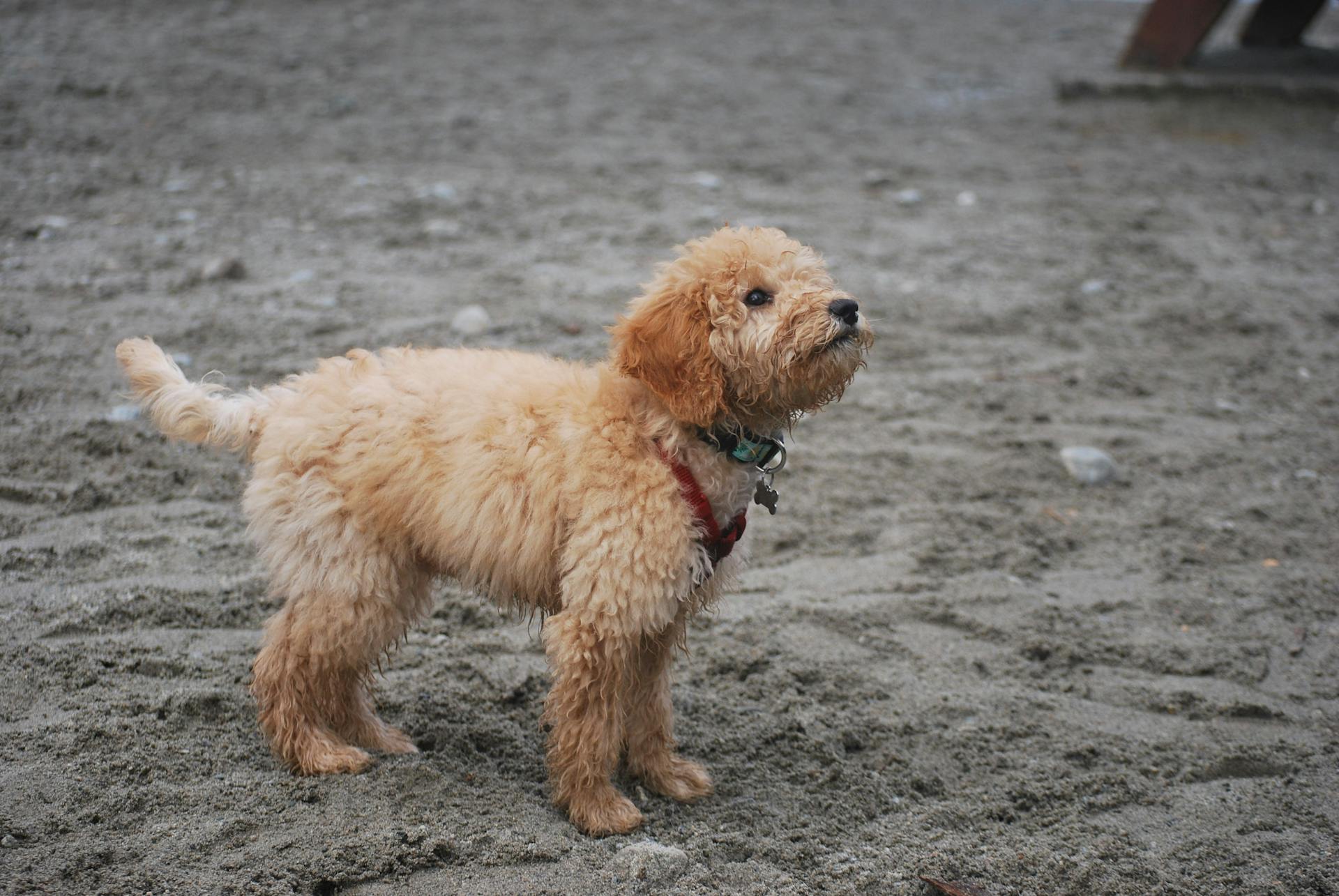
Mini Goldendoodles are known for their high energy levels, which can be a blessing for active families or a challenge for those who prefer a more laid-back lifestyle.
Their intelligence and trainability make them easy to teach, but they can get bored if they don't receive enough mental and physical stimulation.
Mini Goldendoodles typically require at least 30 minutes of exercise per day, which can include walks, playtime, and training sessions.
Their energy levels can be managed with regular exercise, consistent training, and plenty of playtime.
Are Mini Goldendoodles Hyper?
Mini goldendoodles have plenty of energy, but they're not as hyperactive as some breeds. They're ranked as medium-high in terms of energy levels.
Regular walks each day and playtime should be enough to drain their energy. Mini goldendoodles enjoy short bursts of energy rather than long marathon sessions.
Understanding Energy Levels
Mini goldendoodles are naturally energetic dogs, but their energy levels can vary depending on their age and individual temperament. They are bred from two very intelligent breeds – poodles and golden retrievers – which makes them fun to be around, but also prone to getting into mischief.
As puppies, goldendoodles tend to be more energetic and excitable, but this usually passes as they mature around 12-18 months of age. However, even after they lose their puppy teeth, they may still display puppy-like behavior and have surplus energy.
You can expect your mini goldendoodle to have a moderate to high energy level, requiring around 20-30 minutes of daily exercise and playtime. They are eager to please and very smart, making them easy to train, but they do need regular mental stimulation to prevent boredom and hyperactivity.
Here are some signs that your mini goldendoodle may have excess energy:
- Problem barking: If your dog is barking excessively, it may be a sign that it needs attention and exercise.
- Pulling on the leash: If your dog is consistently pulling on the leash, it may be a sign that it has too much pent-up energy.
- Destructive behavior: Chewing on things it shouldn't and destroying furniture or toys is a sign of excess energy.
- Physically tiring quickly: If your dog seems to cycle through zoomies and passing out, it's a sign that it's not getting enough exercise.
Remember, every dog is different, and what works for one mini goldendoodle may not work for another. But with patience, consistency, and the right training, you can help your dog manage its energy levels and become a well-behaved and loving companion.
Recognizing and Managing Excess Energy
Mini goldendoodles are known for their boundless enthusiasm and zest for life, which can sometimes be misinterpreted as hyperactivity. They're naturally energetic dogs that require regular exercise and playtime to keep them happy and healthy.
Problem barking is a common sign of under-stimulation in mini goldendoodles. If your pet is whining and barking excessively, it's likely a cry for attention and exercise.
Pulling on the leash is another indication that your mini goldendoodle has too much pent-up energy. If you've trained your dog to walk nicely on a leash, constant pulling is a problem that needs to be addressed.
Destructive behavior, such as chewing on things it shouldn't, is a sign of excess energy in mini goldendoodles. Providing more exercise and playtime can help prevent this behavior.
Mini goldendoodles tend to tire quickly, which can lead to sudden bursts of energy, known as zoomies. This is a sign that they're not getting enough physical activity throughout the day.
Here are some common signs of excess energy in mini goldendoodles:
- Problem barking
- Pulling on the leash
- Destructive behavior
- Physically tiring quickly
It's essential to recognize that mini goldendoodles are most hyper during the early stage of life, typically up to 3 years old. They tend to calm down a bit by the time they reach 10 years old.
Choosing and Caring for a Mini Goldendoodle
Mini goldendoodles have a medium-high energy level, requiring regular walks and playtime to keep them happy and healthy. They enjoy short bursts of energy rather than long marathon sessions.
To determine if a mini goldendoodle is right for you, consider your lifestyle and whether you can provide at least 20 to 30 minutes of exercise per day. If you have a slower lifestyle or prefer an inactive pet, a mini goldendoodle may not be the best fit.
Mini goldendoodles are a great choice for families who want a playful and affectionate pet. They can bring joy and companionship to your household with the right exercise and loving care.
Good with Kids?
Mini goldendoodles are a fantastic family pet, and they're great around kids. They're also loving and affectionate towards their family.
They love to play, which is perfect for rambunctious children. Early socialization and obedience training are crucial to ensure they behave appropriately around kids.
Mini goldendoodles are easy to train, making them a great choice for new pet parents. With proper training, you can teach them good manners and ensure a harmonious household.
Mini Intelligent?
Mini goldendoodles are bred from two very intelligent breeds – poodles and golden retrievers. Their intelligence makes them fun to be around. However, beware that they can get into mischief due to their smarts. Keeping their minds stimulated with treat puzzles can be a good way to curb this behavior.
Choosing the Right Dog
A mini goldendoodle is a great fit if you're comfortable with a medium-high energy dog, which means you'll need to be prepared for daily exercise.
You'll want to provide at least 20 to 30 minutes of exercise per day to keep your mini goldendoodle happy and healthy.
If you're an allergy sufferer, a mini goldendoodle might be a good choice since they are hypoallergenic.
These dogs are perfect for families who want a playful and affectionate companion.
On the other hand, a mini goldendoodle may not be for you if you have a slower lifestyle and prefer an animal that is relatively inactive.
It's also worth considering that mini goldendoodles from breeders can be expensive, so cost is an issue to keep in mind.
If you travel often or have to leave your dog at home alone a lot, a mini goldendoodle might not be the best fit.
Here are some key factors to consider when deciding if a mini goldendoodle is right for you:
- Energy level: medium-high
- Exercise needs: 20-30 minutes per day
- Hypoallergenic: yes
- Best for: families
Remember to Be
Being calm is essential when it comes to your mini goldendoodle's behavior. Mini goldendoodles are bred from two intelligent breeds, poodles and golden retrievers, making them fun to be around, but they can get into mischief due to their smarts.
Calm yourself and then calm your dog; practice just relaxing sitting around your dog. This is a great way to teach them patience and to help you not react to their energy.
Dogs are very sensitive animals and naturally match your energy levels to please you and fit into your environment. Stress, anxiety, and anger are very distressing for dogs and might cause them to act out.
Regularly getting into a frenzy of love and fuss can be detrimental to your dog's behavior. Instead, be calm and consistent, and your dog will most likely match your energy levels.
Mini goldendoodles have plenty of energy, but they're not as active as some breeds, so regular walks each day mixed with playtime should be enough to drain their energy.
Caring for Your Pet
Goldendoodles can be lively, especially when they're left alone for long hours, so it's essential to provide them with plenty of exercise and mental stimulation to keep them calm.
Boredom can be the absolute enemy of calm, so make sure to engage your mini Goldendoodle in fun activities, such as trips around the block or playtime with toys.
High-energy levels are a feature of the Goldendoodle breed, and they inherit this trait from their intelligent, working-dog parents.
You'll need to keep on top of your pooch's training to ensure you have the commands required to control their behavior when things get too fun.
For your interest: Why Are Goldendoodles so Expensive
If your pup is frequently left alone, they'll be extra lively when they finally get their family back home, so plan for regular breaks and visits.
Proper training and a health-promoting daily routine are essential for bringing out the best in your pet, especially during the puppy stage.
A daily routine that includes regular walks, playtime, and mental stimulation will help evening out your mini Goldendoodle's energy levels and reduce the likelihood of destructive behavior.
Training and Exercise
Mini Goldendoodles are known for their moderate energy level, requiring around 20 to 30 minutes of daily exercise. They adapt quickly to most hot and cold weather climates, making them an excellent all-weather dog selection.
For a goldendoodle, exercise is paramount, and daily exercise split into two walks is ideal. Dog parks are great for socialization and training, which can help your dog learn how to maintain a calm demeanor.
The amount of exercise varies depending on the goldendoodle's stage of development:
Regular exercise can help prevent hyperactivity, and giving your doodle more exercise is often the easiest way to deal with a hyperactive doodle.
Get Active
Getting your dog active is a great way to manage their behavior and energy levels. Regular exercise is essential for Goldendoodles, with most needing a daily walk or playtime to tire themselves out.
A good starting point is to break down daily exercise into two walks around your local area or a dog park, which provides opportunities for socialization and training. For most doodles, this is ideal, but the amount of exercise varies depending on their stage of development.
Here's a rough guide to get you started:
It's also a good idea to mix up the types of exercise you do with your dog. This could include going for a run or jog, playing fetch, or simply letting them play in a securely fenced area.
Scent Training
Scent training is a great way to keep your goldendoodle happy and occupied. It combines physical and mental stimulation, making it an effective way to burn off excess energy.
Playing fetch is great for physical stimulation, but scent training takes it to the next level by engaging your dog's sense of smell. Sniffing is physically and mentally tiring for your goldendoodle, so it's a great way to calm them down.
To start scent training, hide treats in empty cardboard boxes. You can use boiled chicken, dried liver snacks, or grated cheese as rewards. Reward your dog every time it finds a hidden treat.
As your dog gets more experienced, increase the difficulty of the hiding places gradually over time. This will keep your dog engaged and challenged.
Behavioral Stages and Energy Levels
Mini goldendoodles are known for their boundless enthusiasm and zest for life, which can be both a blessing and a challenge for their owners.
Mini goldendoodles are naturally energetic dogs, and their high energy levels are a feature of the breed. They inherit this trait from their intelligent, working-dog parents.
The first few years of a mini goldendoodle's life are typically marked by intense periods of play and longer naps, with most doodles starting to calm around 12-18 months of age.
As a general rule, doodles are most hyper during the early stage of life, then become a little more docile at three years old and calm down a lot by the time they reach 10.
If your mini goldendoodle seems to cycle through zoomies and passing out, it's a sign that it's not getting enough exercise. These sudden bursts of energy occur spontaneously when your pet hasn't done enough throughout the day or week to release it.
Excessive barking, pulling on the leash, and destructive behavior are all signs of excess energy in mini goldendoodles. These behaviors can be addressed by adding more exercise and playtime to their routine.
Here's a rough guide to the behavioral stages of mini goldendoodles:
Addressing Overactive Behavior
Mini Goldendoodles are known for their high energy levels, but it's essential to remember that this behavior won't disappear completely as they age. In fact, Goldendoodles are "fun and excitable for life!"
Overactive behavior in Goldendoodles, especially in the early stages of life, can be attributed to a combination of natural temperament and lack of exercise. Proper training and a daily routine are crucial in bringing out the best in your pet.
Here are some key components to help even out your mini Goldendoodle's energy levels:
- Stop excessive barking: If issues such as problem chewing and excessive barking aren't nipped in the bud during puppyhood, these bad habits can persist.
- Prevent biting: Puppies mouth and bite as a matter of course, but this shouldn't persist beyond around 12 months of age.
As you navigate your mini Goldendoodle's puppy stage, remember that they'll start to calm down around 12-18 months of age, and their energy levels will decrease as they enter adulthood.
Why Is My Puppy Being Naughty?
As you're likely aware, Goldendoodles are known for their energetic nature, especially during the puppy stage. They tend to be hyperactive and forget their manners, leading to naughty behavior.
Licking, zoomies, and all-around hyperactive behavior are common in younger Goldendoodles, making them prone to being naughty.
The good news is that this energy won't disappear completely when adulthood arrives, but it is expected to lessen. Slow training processes can start to prepare doodles for adult life.
By the time they hit 3 months, your Goldendoodle won't feel like a baby anymore, but they'll still be very much a puppy in their thinking and how they respond to things. This is a crucial period where they'll test the boundaries of what they can and can't get away with.
You may start to see an increase in undesirable behaviors such as chewing as their teething really ramps up. Providing appropriate chew toys can help save both your belongings and your fingers.
Training will need to be stepped up in this period as your pup will begin to assert their dominance over you. Consistent, positive methods are essential to remind them of their place in the pack.
Most Goldendoodles will start to calm around 12-18 months of age, but you can still expect excitable behavior for months after losing their puppy teeth at 6-8 months.
Here's an interesting read: When Did Goldendoodles Originate
Overactive Behavior in Older Adults

Overactive behavior in older Goldendoodles can be a challenge for owners. It's essential to remember that their fun and excitable nature won't disappear completely as they age.
Goldendoodles are designed to be energetic and playful, so it's unrealistic to expect them to calm down completely. This means that owners need to find ways to manage their overactive behavior.
If issues like excessive barking and problem chewing aren't addressed during puppyhood, they can persist into adulthood. This makes it crucial to nip these bad habits in the bud early on.
Puppies mouth and bite as a matter of course, but this behavior should stop around 12 months of age. If it doesn't, it may be a sign of underlying issues that need to be addressed.
Here are some age-related milestones to keep in mind:
- Reduction in energy levels expected around 1-2 years old
- Manic behavior may persist, but should not be as intense as during puppyhood
Featured Images: pexels.com


